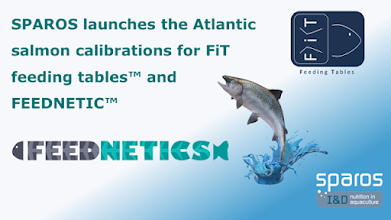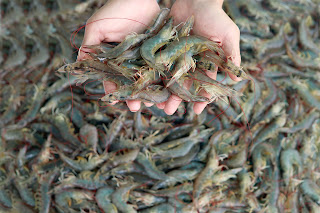Fish farmers are focused on their role in ocean stewardship and addressing the sustainability of food systems, especially with climate change. Trout farmers, Kames Fish Farming Ltd. in Scotland, and salmon farmers, Salmones Aysén in Chile, have long been dedicated to caring for the waters where they raise their high-quality fish. Now, they are leading the way to improve their operations further to meet sustainability goals by joining Cargill's SeaFurther Sustainability initiative.
The three key areas of SeaFurther are:
Image credit: prilfish on Flickr
(CC BY 2.0)
- Transforming raw materials: Working with customers and suppliers to identify and grow planet-friendly ingredients and find new ways to reuse by-products.
- Innovating and enhancing: Focusing on ways to increase fish efficiency, getting the most out of production while using fewer resources and reducing the impact on the ocean.
- Safeguarding animal health: Developing fish nutrition that promotes and enhances the health and welfare of farmed fish and working with our customers to make sure fish in their care are managed to the highest standards.
''In order to develop sustainably, aquaculture has to minimise the carbon emissions it creates. With SeaFurther we support salmon farmers in charting a path to net-zero emissions, helping them to meet science-based targets that have been set by the industry,'' says Helene Ziv-Douki, president of Cargill's aqua nutrition business. ''It all starts with understanding the goals of our customers and analysing their current situation; then based on the data that we collect on their farms, Cargill is able to precisely identify hotspots in the value chain where it will be possible to intervene to reduce emissions. In order to develop the three key pillars of SeaFurther, our feed business will work on: suppliers development, feed material/supply, feed efficiency/management. By helping customers catching opportunities in these areas, as well as supporting on animal health and welfare, Cargill can play a pivotal role for the success of its partners and contribute to reduce the carbon footprint of the industry. Launched in salmon and trout, SeaFurther can also be applied to other species, where the impact will be even greater. The more our expertise grows between now and 2030, the more reductions we will be able to bring.'
The SeaFurther initiative combines Cargill's leading nutritional knowledge with our supply chain expertise to create opportunities for our customers to implement significant reductions in carbon emissions in line with science-based targets. Cargill has built a system of data on their raw material suppliers and their customers, from which they can identify and implement options to reduce carbon emissions from raw material origin to fish at harvest for each customer.
This creates a credible reduction pathway for each customer and then opens the opportunity to offset remaining emissions to create a net-zero fish, which has a strong market appeal. Managing down carbon emissions in this way will support sustainable aquaculture development as called for by the Blue Food Assessment.
Dave Robb, program lead for Cargill's SeaFurther Sustainability initiative says, 'SeaFurther has created vertical collaborations with our suppliers and customers and horizontal collaborations within Cargill. Aligning on a common carbon reduction goal makes the message simple, but SeaFurther supports much more than just the carbon goal for sustainable aquaculture. The premise is based on creating a common approach and data to deliver sustainable supply chains for feed and farming.'
Cargill has already identified 'hot spots' where these companies can immediately improve their operations to help reduce carbon. For example, in the short term, feeds will be formulated with the same nutritional properties as previously required by the customers but with a lower carbon footprint. This means that fish fed these feeds will grow as well as before, but with fewer carbon emissions. This can drive a certain amount of reduction in the feed footprint. But, in addition, over the next few years, Cargill will work with their suppliers to produce raw materials with lower emissions. These can then be used in the new formulations – bringing further reductions in line with the 2030 goal.
Carbon credits from Cargill's carbon trading desk could then be coupled to this reduction pathway, creating a credible net-zero fish, in line with the Science Based Targets initiative draft guidance. This brings a strong product to the market – a net-zero carbon salmon or trout, with a clear reduction pathway to lower emissions each year.
'We recognise our role as providing a solution to the ocean's recovery whilst feeding the increasing population and understand the responsibility that farming in the sea entails. We are proud to lead the way for reducing emissions from the trout industry through this partnership with Cargill,' says Neil Manchester, Managing Director, Kames Fish Farming Ltd. 'However, carbon efficiency resulting in reduced emissions will only be fully achieved if we work together across the whole supply chain, so it's fantastic that this initiative and open communication is happening rapidly and at scale.'
''Salmones Aysén is a family-owned and operated company that have been in the path of becoming carbon neutral company with a carbon neutral produce for a few years now. Adopting different politics on how to farm and process our salmon, the company is changing its culture and growing into this new way of farming to achieve not only a zero emission, but a sustainable and fair way of producing,'' says Pablo Baraona, director of Salmones Aysén. ''Our commitment comes from the very heart of the company, because is a conviction that the owners of the company have themselves, not only in this company, but in life. Therefore, we have decided to commit with SeaFurther program along with Cargill, in order to move forward with this objective that we are convinced we are going to achieve in the coming years.
For more information about Cargill visit the website, HERE.




.jpg)










